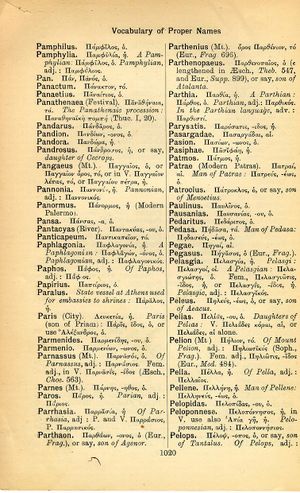Pandion
μηδενὶ συμφορὰν ὀνειδίσῃς, κοινὴ γὰρ ἡ τύχη καὶ τὸ μέλλον ἀόρατον → never mock a disaster, fate is common to all and the future unknown
English > Greek (Woodhouse)
Πανδίων, -ονος, ὁ.
Latin > English (Lewis & Short)
Pandīon: ŏnis, m., = Πανδίων.
I A king of Athens, father of Progne and Philomela, Hyg. Fab. 48; Ov. M. 6, 426; 676: Pandionis populus, i. e. the Athenians, Lucr. 6, 1143: Pandione nata, i. e. Progne, Ov. M. 6, 634.—Transf., for the nightingale, Ov. P. 1, 3, 39: Cecropiae Pandionis arces, Mart. 1, 26, 3.—Hence,
B Pandīŏnĭus, a, um, adj., Pandionian: Pandioniae Athenae, Ov. M. 15, 430: Pandionia Orithyia, the sister of Pandion, Prop. 1, 20, 31: res Pandioniae, the Athenian state, Claud. IV. Cons. Honor. 506: arces, the citadel of Athens, id. Rapt. Pros. 2, 19; also called mons, Stat. Th. 2, 720: volucres, the nightingale and the swallow, Sen. Octav. 8: cavea, the Athenian theatre, Sid. Carm. 23, 137.—
II A son of Jupiter and Luna, Hyg. Fab. praef.
Latin > French (Gaffiot 2016)
Pandīōn,¹⁶ ŏnis, m. (Πανδίων), nom de divers personnages, nott :
1 Pandion [fils d’Érechthée, père de Procné et de Philomèle] : Ov. M. 6, 426 ; Lucr. 6, 1143
2 fils de Jupiter et de la Lune : Hyg. Fab. præf.
3 roi de l’Inde au temps d’Auguste : Plin. 6, 23
4 le rossignol : Ov. P. 1, 3, 39 ; Mart. 1, 26, 3.

